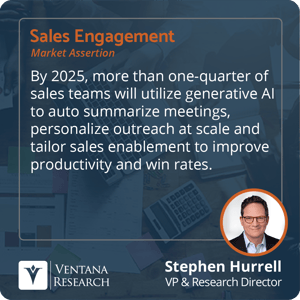Having worked at a start-up during the first wave of artificial intelligence (AI) that was predicted to revolutionize sales in the mid-2010s, I guess I am a natural skeptic when it comes to new claims about how AI will change sales forever. In the mid-2010s, vendors were using machine learning (ML) models trained on sets of historical opportunity data that represented closed won and closed lost deals. The ML models were looking for correlation and patterns to see whether they could predict deals that were likely to win versus those that were not. Likewise, ML was applied to outbound calls and emails by BDRs and SDRs to see if the models could predict the optimum time to call, or the optimum sequence of outreach plays, based on a history of what worked and what didn’t in terms of desired outcomes. The aim was to enable prioritization around whether the opportunity represented a probable win in terms of buyer/seller fit, and to follow and score the activity and sales progression as to whether on or off track, to predict when the deal might close win. A byproduct was to identify which buyer attributes correlated with a successful sale, as well as which actions and in what order, as markers of a successful outcome.
Over time, many vendors’ products have included these feature sets as part of their offerings, whether the vendors offer applications that are a complementary product to a CRM system or by vendors of the CRM system itself. The concept has also been extended into other areas, such as creating data-driven, as opposed to bottom-up, judgement-based, sales forecasts as well as recommendations as to the next best action. In addition, ML has been used to analyze conversations to determine both the effectiveness of speech in sales and also to recommend which words, phrases or tone are more effective in achieving the next step in the sales process. But primarily, these AI models have been used to predict the probability of whether a lead or a sales opportunity would progress to be closed won or otherwise.
But despite all the vendor development efforts poured into this functionality, it’s taken many years for this to be generally adopted, and even now, doubts around the quality or usefulness of these predictions persist among frontline salespeople and line managers. I have previously written about the state of AI for marketing and sales in an Analyst Perspective.
Fast forward to today and taking center stage are the recent vendor announcements on the use and deployment of new large language model (LLM) technology — more colloquially referred to as generative AI. The promise promoted by vendors is that generative AI will turbo charge sales and marketing efforts. For marketing, one way this will happen is by improving the efficiency of marketing copy and potentially enabling personalization at scale. For field sales, the suggestions are that generative AI will improve both the ability of sales to craft emails for outreach and responses and to enhance presentations. Other use cases include using generative AI to summarize calls automatically and post them to the associated opportunity record, improving both accuracy and timeliness. This will have positive effects on sales productivity, but on its own will represent less a revolution than an evolution.
A downside of the ubiquity of generative AI is that general adoption could lead to an undifferentiated superficial polish if sales and marketing teams utilize the same approach and data. But as has been noted elsewhere, the real value of generative AI for B2B will be found by leveraging curated data, both internal and external. One of the truisms of effective data science is the need for three conditions to be met — high quality and accurate data, appropriate AI models and technology, and relevant domain expertise to know which questions to ask and how to interpret the answers. This was valid with predictive AI and will be the same for generative AI in B2B use cases. Generic data will lead to generic answers that will accrue no competitive advantage if all your competitors are also utilizing it. So, as in the last great wave of AI announcements in the mid-2010s with lead and opportunity scoring use cases, the usefulness and dependability of AI is very much dependent on differentiation afforded by the data or intrinsic differentiation from the product or service on offer. Generative AI won’t create these differentiations, but its use can enhance the ability to effectively communicate and at scale.
Peering into the future, where generative AI can be a force for revolutionary change is through the large-scale adoption of new ways of interacting with digital data through natural language interfaces. Publicly available surveys that have asked salespeople what technologies they believe are necessary for them to be effective have shown that the top three are email, phone, and a notetaking app. There is no specific sales technology in sight. Perhaps new natural language interfaces will provide sales teams with a way to interact with valuable data beyond searching through lists or surveying hundreds of fields on an opportunity record.
And although not a very exciting message to be pushing, generic LLMs will lead to generic results that convey little to no competitive advantage. The advantage will come from both highly curated public data sets and proprietary internal data sets with a strong feedback loop that is constantly evaluating whether the desired outcomes have been achieved. The danger of erroneous results is much reduced using proprietary and domain-specific curated data as compared with generic, open data sets, but it is not zero. So, human validation is important, especially with customer- and prospect-facing, AI-generated, personalized content; the personalization needs to be accurate. Likewise, any content that is AI generated in response needs to be accurate within context, not just for liability issues but from a customer or prospect viewpoint as part of an overall sales process.
In fact, by 2025, we assert that more than one-quarter of sales organizations will utilize generative AI to auto-summarize meetings, personalize outreach at scale and generate tailored sales enablement to improve  sales productivity and enable more time for direct sales engagement to improve win rates. We would recommend organizations to ask their vendors about the use of generative AI for sales productivity, whether as part of a base CRM system or if using an add-on system for pipeline management and forecasting. Look closely at overblown claims versus practical examples that aid in data capture and summarization, improve outreach content, or help generate sales enablement content. Combined with existing applications of predictive AI, there are certainly more readily available capabilities that aid in the selling process.
sales productivity and enable more time for direct sales engagement to improve win rates. We would recommend organizations to ask their vendors about the use of generative AI for sales productivity, whether as part of a base CRM system or if using an add-on system for pipeline management and forecasting. Look closely at overblown claims versus practical examples that aid in data capture and summarization, improve outreach content, or help generate sales enablement content. Combined with existing applications of predictive AI, there are certainly more readily available capabilities that aid in the selling process.
Over time, technology will improve via feedback loops that will help fine-tune models based on evaluation of desired versus undesired outcomes. But I believe the real promise will come when buyers can engage, at a location and time of their choosing, in an intelligent conversation with a generative AI-enabled seller to quickly understand whether the deal is a match to that buyer’s advantage. Then AI will truly revolutionize selling.
Regards,
Stephen Hurrell
 sales productivity and enable more time for direct sales engagement to improve win rates. We would recommend organizations to ask their vendors about the use of generative AI for sales productivity, whether as part of a base CRM system or if using an add-on system for pipeline management and forecasting. Look closely at overblown claims versus practical examples that aid in data capture and summarization, improve outreach content, or help generate sales enablement content. Combined with existing applications of predictive AI, there are certainly more readily available capabilities that aid in the selling process.
sales productivity and enable more time for direct sales engagement to improve win rates. We would recommend organizations to ask their vendors about the use of generative AI for sales productivity, whether as part of a base CRM system or if using an add-on system for pipeline management and forecasting. Look closely at overblown claims versus practical examples that aid in data capture and summarization, improve outreach content, or help generate sales enablement content. Combined with existing applications of predictive AI, there are certainly more readily available capabilities that aid in the selling process.








